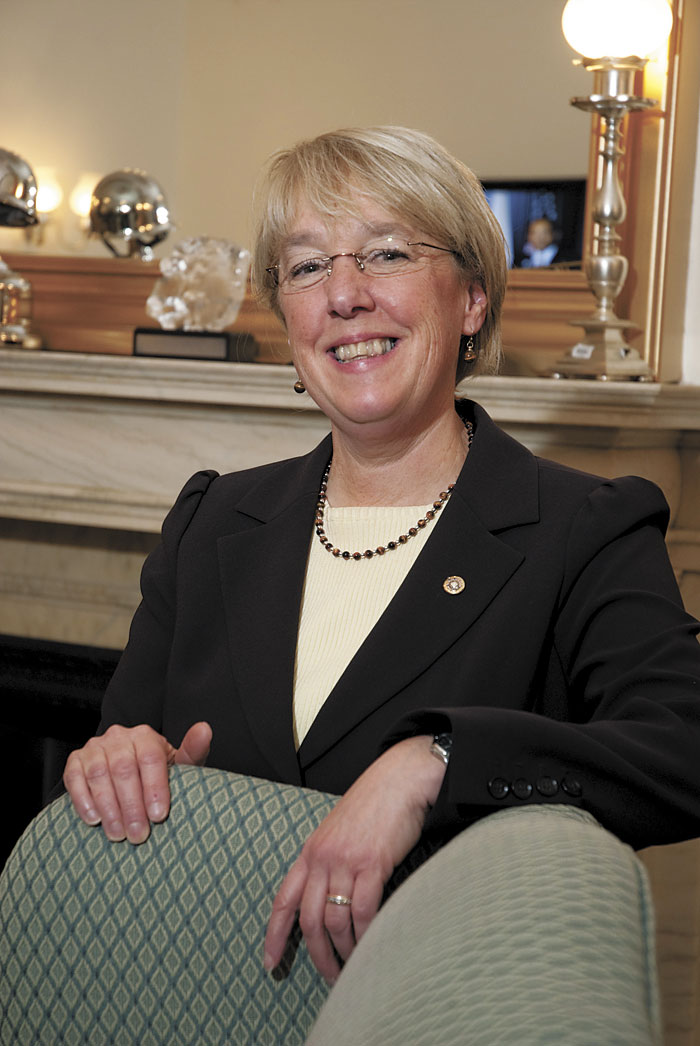In 2006, Emilie Boyles decided to run for Portland’s City Commission (the equivalent of our city council). She was, it’s fair to say, a nontraditional candidate: A single mom working two jobs and living in a trailer on a busy street in the city’s Southeast neighborhood, Boyles was drawn into politics by a new program that allowed candidates to fund their campaigns with public money. As Boyles recently told the Weekly in an interview, she saw the funding mechanism as an opportunity for someone who’s struggling to make ends meet to get a shot at the halls of power.
Others say she saw it as an easy way to get some fast cash. Before the vote even happened, Boyles was accused of improperly using public funds to pay her 16-year-old daughter $12,500 (Boyles says it was for campaign work on the Internet) and to reimburse herself for calls made from her home telephone. Boyles’ use of taxpayer money to pay for a year’s worth of office space, up front, was also called into question.
Instead of realizing her purported dream to hold public office, Boyles was ordered to pay back the money she’d been given, and ultimately left the state—she says she couldn’t get a job because of the scandal. Boyles has paid back about $69,000 to date, according to the city auditor’s office. She currently owes $112,919 including interest and penalties.
The 2006 incident was just the first hiccup in Portland’s fledgling Voter Owned Elections system. And as it has done with all progressive ideas adopted by that perpetually superior city, Seattle has decided that it should now follow suit. Led by council member Sally Clark, with the support of the mayor and a majority of the council, the city plans to convene a task force in the coming months to consider implementing its own taxpayer-funded campaign system.
Candidates for a citywide council seat in Seattle need to raise around $250,000 to be viable. But given individual contribution limits of $700 per candidate for the primary and $700 for the general election, candidates often end up loaning themselves large sums of money. As a result, council seats are held by those who can afford it—or by local celebrities, like former journalist Jean Godden, who have name recognition going in.
Clark hopes public financing will get more people involved. “My interest is in broadening participation,” she says. “Can we make the barriers fewer and shorter for candidates and broaden the pool of people contributing?”
Under the Portland rules, candidates for mayor who choose to go the “voter-owned” route can qualify for $200,000 in primary funds, and $250,000 for the general election, if they collect a signature, and $5, from 1,000 citizens. In return, candidates promise not to accept any direct contributions and to limit in-kind contributions to $12,000. The rules for commission seats are the same, but the amount of public funds given is lower.
But the program is not necessarily producing the intended effects. For example, earlier this year Portland’s incumbent commissioner Erik Sten, the author of the public finance system, who was not scheduled for a re-election bid until 2010, announced he was stepping down immediately. Suddenly the city needed a special election that it didn’t have rules to handle. At issue: whether the voter-owned candidate for Sten’s seat should receive the full amount of public funding, given the race’s truncated schedule.
In this case, the voter-owned candidate is Sten’s chief of staff, a City Hall insider who some argue was uniquely positioned to get the requisite signatures in short order, and not the grassroots type Portlanders had envisioned the system would benefit. It’s an ironic twist: The candidate running a privately financed campaign could have to scramble to match the publicly funded candidate’s war chest, especially if the latter candidate gets the full amount.
“The best way I can describe it is that it just feels icky,” says Portland City Commissioner Randy Leonard. Leonard was the only commissioner to vote against the program when it was created in 2004. He says he still sees no difference between the voter-owned system and privately financed campaigns, except that taxpayers are footing the bill—with money that comes out of the general fund and is expected to total around $2 million this year.
“This system has demonstrated as many problems of producing candidates as the private system has,” he says. “We have yet to have a grassroots person. People for months try to get the signatures and can’t. I thought it was supposed to open up the system to outsiders.”
Indeed, Sten, who ran as the incumbent in 2006, has been the only publicly financed candidate to win office. But Janice Thompson, executive director of Democracy Reform Oregon, a nonprofit dedicated to campaign finance reform, says that’s not the only way to measure success.
“We are seeing reduced spending,” Thompson says, adding that some privately financed candidates are even capping their donations to the same amount received by publicly funded candidates—a phenomenon she likes to call the “Portland Miracle.”
Plus, Thompson says, there’s been a more diverse pool of candidates and donors. “We’ve had record numbers of people participating and feeling they’re part of the game,” she says. “In 2004, 69 percent of the donations came from 7 percent of the donors writing checks of $1,000 or more. That was the entry fee. Now the fee is $5.”
Still, Thompson acknowledges there have been problems. “The lesson from Portland is that you need good administration of these programs,” she says.
There have been other snafus with the system. Mayoral candidate Sho Dozono was recently kicked out of the public funds program after accepting a $27,295 poll done on his behalf and paid for by a lobbyist, a violation of the in-kind contributions rule. And in 2007, Vladimir Golovan (who served as Boyles’ campaign manager during her scandal-ridden 2006 bid) was sentenced to nine months in jail for forgery in his work gathering signatures for another candidate. An investigation by The Oregonian found that he’d falsified signatures for Boyles as well. Boyles, who later testified against Golovan, says she doesn’t know how many of the 1,000 names were forged, but says it was a “huge number.”
Seattle’s Clark says the strife down south offers a good case study: “We want to look at what Portland’s going through. The key is to think long and hard and plan this out well.”
Nationwide, 17 states and 14 cities and counties have some form of public financing, according to the Center for Governmental Studies, a Los Angeles–based think tank. The center’s president, Bob Stern, says not every city has had problems like Portland, but that there have been other instances of fraud. He notes an example in Arizona where a couple of college students qualified for public financing, then spent the money on booze. (They later repaid the state.)
Clark says Seattle will consider both a fully-funded model like Portland’s and a partially-funded system like the one used in San Francisco, which is meant to augment private donations but still requires candidates for mayor or the board of supervisors to collect small donations from citizens in order to receive matching funds from the city.
“Clearly cost [to taxpayers] will be a factor” in determining which model Seattle chooses, Clark says.
The city had a matching-fund system to help pay for campaigns until 1992, when voters statewide approved a campaign finance reform initiative that prohibited such programs. Prompted by pleas from Seattle and other cities, the state legislature last month approved a bill to allow local jurisdictions to establish public financing systems, but there’s one catch: voter approval is required.
Seattle could have such a measure on the ballot as early as November, which would establish public financing in time for the 2009 mayor’s race and four council contests. But Clark says that might be rushing it.
Portland residents didn’t get the chance to approve the program; it was put in place by the city commission. But they will have the opportunity to recall it in 2010—and even advocates think that vote is likely to be close.
Commissioner Leonard disagrees. He says the program is going to “get hammered.” He says Portland’s experience has soured a majority of taxpayers on the idea.
Meanwhile, Boyles is settling into a new life in Glendive, Montana, as a TV reporter for a CBS affiliate. Though she says she was duped by her campaign manager and his signature-gathering scheme, she maintains she did not improperly use campaign dollars. Still, Boyles says she’d like to pay the city back, if she had the money. Ultimately, she claims she was hurt by the system that was supposed to help people like her.
“It was extremely confusing and was not well thought out or put together,” Boyles says. “Our system needs reform. There’s no question about that. Our system needs to have a method to stop this divisiveness between the haves and the have-nots… The people who set up Voter Owned Elections were well-meaning, but they didn’t do it in a way that fixed the problem.”






